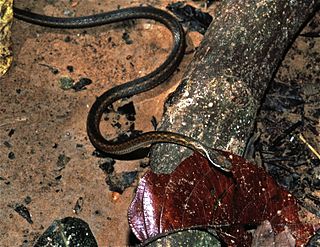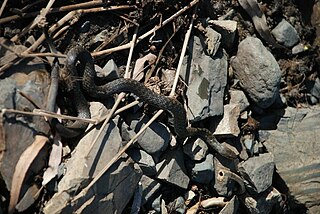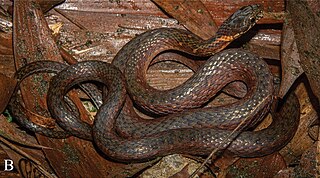
Hebius khasiensis, commonly known as the Khasi Hills keelback or Khasi keelback, is a species of colubrid snake endemic to southeastern Asia.

The Natricinae are a subfamily of colubroid snakes, sometimes referred to as a family (Natricidae). The subfamily comprises 36 genera. Members include many very common snake species, such as the European grass snakes, and the North American water snakes and garter snakes. Some Old World members of the subfamily are known as keelbacks, because their dorsal scales exhibit strong keeling.

Rhabdophis is a genus of snakes in the subfamily Natricinae of the family Colubridae. Species in the genus Rhabdophis are generally called keelback snakes, and are found primarily in Southeast Asia.

Lycodon is a genus of colubrid snakes, commonly known as wolf snakes. The Neo-Latin name Lycodon is derived from the Greek words λύκος (lykos) meaning wolf and οδόν (odon) meaning tooth, and refers to the fang-like anterior maxillary and mandibular teeth. They are nonvenomous, but many members of this genus strongly resemble the venomous kraits in appearance, an example of Emsleyan mimicry.
Thermophis baileyi, also known commonly as Bailey's snake, the hot-spring keelback, the hot-spring snake, and the Xizang hot-spring keelback, is a rare species of colubrid snake endemic to Tibet.

Opisthotropis is a genus of snakes in the family Colubridae. The genus is endemic to Southeast Asia and South China.
The white-lipped keelback is a species of nonvenomous natricine snake found in central Vietnam, Cambodia, and Laos.
Andrea's keelback is a species of nonvenomous colubrid snake endemic to Vietnam.
Thermophis is a genus of snakes in the family Colubridae. The genus is endemic to China.

Hebius deschauenseei, commonly known as the northern keelback or Deschauensee's keelback, is a species of nonvenomous snake in the subfamily Natricinae of the family Colubridae. The species is endemic to Asia.

Trimerodytes is a genus of snakes in the subfamily Natricinae of the family Colubridae. The genus is endemic to East Asia and Southeast Asia.

Tropidonophis is a genus of snakes in the subfamily Natricinae of the family Colubridae.
Groundwater's keelback is a species of snake in the family Colubridae. The species is endemic to Thailand.

Hebius sauteri, commonly known as Sauter's keelback or the Kosempo keelback, is a species of snake in the family Colubridae. The species is endemic to Asia.
Pope's keelback is a species of snake in the family Colubridae. The species is found in Vietnam and southern China.

Anderson's stream snake, also known commonly as Anderson's mountain keelback, is a species of snake in the family Colubridae. The species is native to Asia
Herpetoreas is a genus of snakes in the subfamily Natricinae of the family Colubridae. The genus is endemic to South Asia.
Hebius clerki, also known commonly as the Yunnan keelback, is a species of snake of the family Colubridae. The species is native to Asia.

Hebius weixiensis, the Weixi keelback snake, is a species of snake of the family Colubridae. It is endemic to China and known from around Lijiang in Yunnan. The specific name weixiensis refers to its type locality, Weixi County.

Hebius maximus, the western China keelback, is a species of snake of the family Colubridae. The snake is endemic to Southwestern China. Originally described as a subspecies of Amphiesma sauteri, its validity has been doubted; however, it was revalidated by a 2022 study based on morphological and molecular evidence. The evidence even warranted the recognition of Hebius maximus as a full species.












